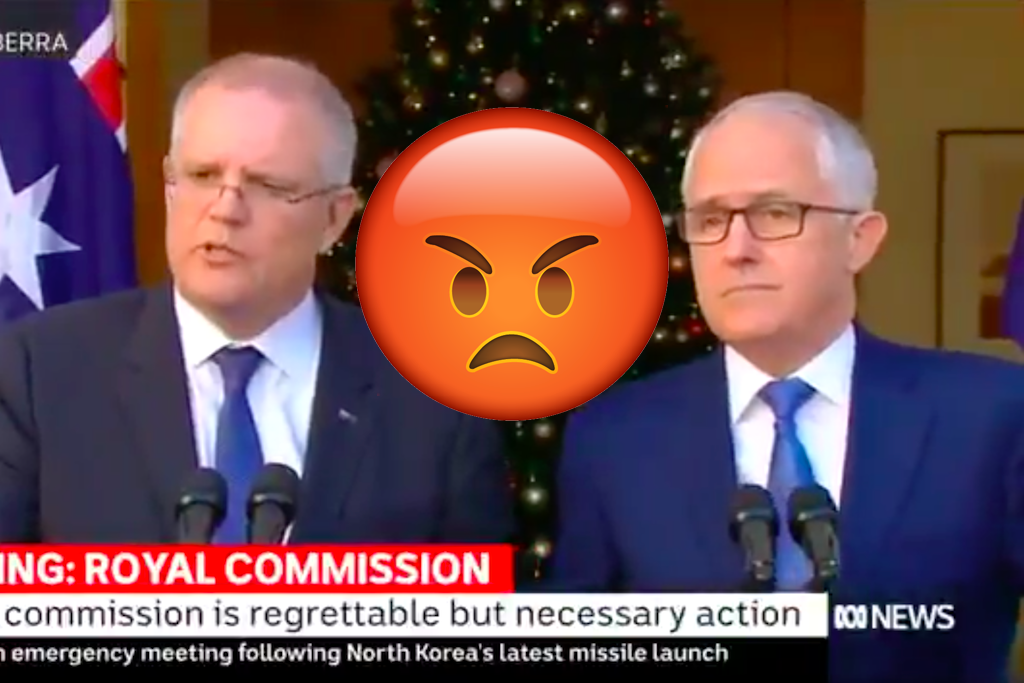Junk Explained: What Did The Government Just Do With The NDIS?
While everyone was playing two up yesterday, the government made a big change.

While you were out at the pub playing two up yesterday, the government dropped a pretty big federal budget announcement that will affect thousands of vulnerable Australians.
It’s the first insight into what we can expect in this year’s budget, which will be released on May 8. Every year in the lead up to the budget, the government will leak certain stories to give people a sense of what to expect. This is usually a way to get the bad news out of the way ahead of the big night, so that on budget night itself, the government can try to tell a positive story. And this story is quite a big deal.
Late on Anzac Day, the ABC reported that the government plans to drop a proposed hike in the Medicare Levy that was going to be used to help fund the National Disability Insurance Scheme (NDIS).
What Does That Mean?
Every taxpayer pays the two percent Medicare Levy. That money goes some of the way to funding Australia’s medical services, giving us access to cheap medicine, bulk billed doctors, decent hospitals, and all that important stuff.
The NDIS was created by the Gillard government. It’s a huge, taxpayer-funded insurance scheme that provides a safety net for people with a disability. Basically, if you’re born with a disability, or something goes wrong and you acquire a disability throughout your life, the NDIS is meant to be there to help you get by.
It’s a big, complicated, expensive scheme, and for years, the government has been saying that there’s a $57 billion shortfall in funding it, which is where the rise in the Medicare Levy came in.
Since last year’s budget, the government has been saying it will increase the levy to 2.5 percent — which would amount to $8 billion a year, or $375 for an average wage earner — to pay for the NDIS.
Treasurer Scott Morrison justified the tax increase, saying it was going to help people like his brother-in-law, Gary, who lives with multiple sclerosis.
It's a move that will save tax payer hundreds, if not thousands of dollars a year. This morning, the government announced they're axing the planned increase to the medicare levy. #9Today pic.twitter.com/6cTdn5KRk4
— The Today Show (@TheTodayShow) April 25, 2018
And unlike most tax increases, this one was actually popular. A Newspoll taken after last year’s budget showed that 54% of people backed the tax hike, because Australians are actually pretty decent, and this is a worthwhile cause.
The policy was also backed by the Australian Medical Association and a bunch of welfare groups, who have been calling for a fully funded program like this for years. But it was opposed by Labor and the Greens, who only wanted the levy raised for higher earners. That meant it was always going to be difficult for the government to get the policy through the Senate. (Labor has already signalled it will match the government’s new policy).
So instead, the government has just scrapped it.
So Who’s Going To Pay For The NDIS?
Good question. The government basically reckons it found $8 billion down the back of the couch.
Speaking on Today this morning, Morrison said that because the economy is improving and more people are finding jobs, the government is receiving more tax money than expected. Today host Karl Stefanovic was a little skeptical this morning:
“Scott Morrison wakes up one morning, he looks under the bed, hey presto, there is $8 billion,” he said.
“It doesn’t happen like that, Karl,” Morrison replied. “Over the last 15 months or so we have seen the economy improving. Over the early part of this year and the latter part of last year we started to see the tax collections that were coming from companies doing better, come into the coffers. We could have greater confidence about revenues into the future.”
The Turnbull Government’s stinking political carcass will not be saved by finally admitting there was no need for an increase in the Medicare levy to fund the NDIS #auspol
— Wayne Swan (@SwannyQLD) April 25, 2018
Which all sounds very nice, right? We get to pay for the NDIS and no one has to pay more tax. Everyone wins.
Except, the government gets forecasts wrong all the time. You may remember during the Rudd/Gillard years, everyone was focused on when the budget would return to surplus. And year after year, then-Treasurer Wayne Swan would say that good news was just around the corner. But, that good news still hasn’t come, because the projections he was using didn’t work out.
Some disability advocates are worried about what this means for the future of the NDIS.
Wheelchair athlete Kurt Fearnley has expressed concern.
Delivered on the evening of ANZAC Day…….. We continue to play politics and kick the can down the road. This move will not go quietly.. #NDIS https://t.co/V6ubCc4u29
— Kurt Fearnley (@kurtfearnley) April 25, 2018
As has Therese Sands, the Co-CEO of People with Disability Australia:
“We are stunned at the news that the federal government is walking away from the commitment to fully fund the NDIS, now and into the future. Last year, the Prime Minister said that the increase to the Medicare Levy was essential so that “it is fully funded so… you will know the money is there.”
“People with disability feel betrayed and ambushed by this decision and are left wondering what else is in this year’s budget?”
